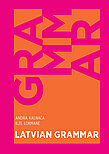Andra Kalnača, Ilze Lokmane. Latvian Grammar. Rīga: University of Latvia Press, 2021,
560 pages.
ISBN 978-9934-18-635-6 (hardback)
ISBN 978-9934-18-646-2 (PDF)
https://doi.org/10.22364/latgram.2021
Grāmatas mērķis ir ziņas par latviešu valodu, tās gramatisko sistēmu padarīt pieejamas plašākai auditorijai ne tikai Latvijā, bet arī ārpus tās. Tas ir svarīgi gan cilvēkiem, kam latviešu valoda ir dzimtā vai kas prot latviešu valodu, gan arī tiem, kas interesējas par Latvijas kultūru, vēsturi un, protams, latviešu valodu. Zinātniskas angļu valodā rakstītas latviešu gramatikas aktualitāti nosaka arī plašā latviešu diaspora ārzemēs, īpaši angliski runājošās valstīs, kur bērni un jaunieši izglītību apgūst savas mītnes zemes valodā, bet ne vairs latviešu valodā. Latviešu gramatika angļu valodā būs noderīga arī tiem, kas apgūst latviešu valodu kā svešvalodu un, kad iepazīts valodas minimums, vēlas uzzināt vairāk par valodas gramatisko sistēmu un tās īpatnībām. Tāpat grāmata būs svarīgs izziņas un materiālu avots tiem, kas māca latviešu valodu – gan kā dzimto vai mantoto, gan kā svešvalodu. Arī ārzemju valodnieku vidū vērojams liels pieprasījums pēc sistēmiskiem un uzticamiem dzimtās valodas runātāju sagatavotiem latviešu valodas datiem, jo latviešu valodā ir ārkārtīgi interesants ļoti senisku un relatīvi jaunu valodas attīstības faktu savijums.
“Latvian Grammar” was written to make information about the Latvian language and its grammatical system more easily available not only within Latvia, but also beyond its borders. A modern grammar of Latvian written in English is as important for native speakers of Latvian as for those who have learned Latvian as a second language and also is of great value for anyone interested in the culture and history of Latvia or the Latvian language itself. The need for a reference grammar of Latvian written in English is especially important right now due to the existence of a large Latvian diaspora community abroad, particularly in English-speaking countries where children and young people are educated in the language of their home countries rather than in Latvian. A Latvian grammar written in English will also be useful for those who are learning Latvian as a foreign language and wish to learn more about its grammatical system and unique features. Likewise, “Latvian grammar” will be a useful reference and source for examples for teachers of Latvian – both those who teach it to speakers as a school or university subject and those who teach it as a foreign language. There is also considerable demand among linguists abroad for a systematic and dependable description of Latvian written by native speakers of Latvian. Latvian is a rather unique combination of ancient as well as relatively new features, which are of interest to researchers abroad and are important for the typological, cognitive, pragmatic, functional, and contrastive analysis of language.

 LU konference
LU konference